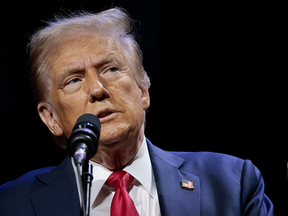Requirement for U.S. citizens living in other countries to be taxed on their international income

Reviews and recommendations are unbiased and products are independently selected. Postmedia may earn an affiliate commission from purchases made through links on this page.
Article content
On the campaign trail, U.S. presidential hopeful Donald Trump has pledged to end “double taxation” of Americans living and working abroad. While details are scarce, it could have implications for the roughly eight million Americans living outside the country, including in Canada.
What did Trump say?
Well, not much in the way of specifics, but he did say he supports ending double taxation of overseas Americans — which, at its most basic, means there could be an end to a requirement for U.S. citizens living in other countries to be taxed on their international income. This requirement is unique to the United States because, unlike most nations, it taxes based on citizenship rather than where one lives and works.
Advertisement 2
Article content
Do American citizens living outside the U.S. pay tax twice on the same income?
No, not for the most part, thanks to tax treaties between countries and credit for taxes paid where one resides — which, in the case of Canada, is usually more than what would be owed in the U.S. There may be additional taxes on some income that is not taxable in one’s home country but is in the United States, said Marla Waiss, a cross-border tax partner with Hodgson Russ, U.S. attorneys. But one thing all foreign-based U.S. citizens face are onerous and potentially expensive administrative requirements to file a tax return each year to determine if they do owe money to Uncle Sam. Failure to file can result in costly penalties.
What about Canadians, including so-called ‘accidental’ Americans?
“Accidental” Americans, those born in the U.S. to non-American parents, many of whom never lived there, are bound to check in annually with the Internal Revenue Service (IRS), the U.S. tax authority. Max Reed, a cross-border specialist at Polaris Tax Counsel, said more than 50 per cent of U.S. citizens living in Canada don’t owe a penny of taxes to the United States, yet they face the same complex compliance burden to prove so as those owing. When new information-sharing requirements between Canada and the U.S. came into force in 2014, some of the one million or so Americans and dual citizens living in Canada took steps to renounce their U.S. citizenship and escape the administrative burden, even though that triggered an expensive “exit” or expatriation tax.
Advertisement 3
Article content
Why is Trump raising the idea now?
Trump hopes to win a second term in the highest office in the land and every vote counts. There are roughly eight million Americans who live outside the country, a “significant” number of potential voters who tend to cast ballots at lower rates that those who live in the U.S, said Reed of Polaris Tax Counsel. Though Trump may be serious about including this in tax reform if he is elected, Reed says he is “absolutely courting the expat vote.”
Recommended from Editorial
-

Talk of Trump tariffs seen as ‘quite low’ risk for Canadian energy
-

Trump tariff proposal could cost Canadians $1,100 per year: report
Will it happen?
Reed noted that the idea of removing the more than century-old practice of citizenship-based taxation has been floated before, including in 2017 when Trump was president, yet it did not happen during his 2016 to 2020 term. “(It) was never included in any of the draft legislation when Republicans held all three branches of government,” Reed said. Waiss said that regardless of who is elected president this November, the U.S. Congress will have several tax issues to deal with in 2025, which “will likely take priority over this.”
• Email: bshecter@nationalpost.com
Bookmark our website and support our journalism: Don’t miss the business news you need to know — add financialpost.com to your bookmarks and sign up for our newsletters here.
Article content






